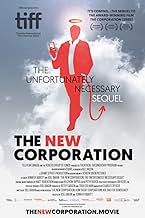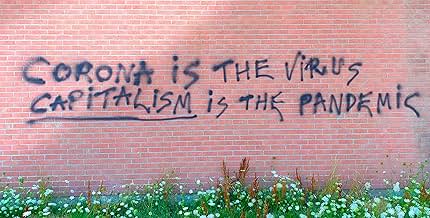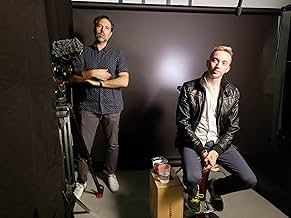The New Corporation: The Unfortunately Necessary Sequel
- 2020
- 1 Std. 45 Min.
IMDb-BEWERTUNG
7,0/10
724
IHRE BEWERTUNG
Füge eine Handlung in deiner Sprache hinzuExposes how companies are desperately rebranding as socially responsible - and how that threatens democratic freedoms.Exposes how companies are desperately rebranding as socially responsible - and how that threatens democratic freedoms.Exposes how companies are desperately rebranding as socially responsible - and how that threatens democratic freedoms.
- Regie
- Drehbuch
- Hauptbesetzung
- Auszeichnungen
- 1 Gewinn & 8 Nominierungen insgesamt
Empfohlene Bewertungen
I don't normally write feedback on fake reviews but these are so obvious its not funny. To name democrats and in particular to call "Kshama Sawant a socialist, but an evil one at that"...... is ridiculous. A right wing opinion that brings politics into a review of a movie/documentary is not right.
Now I will watch this and review it properly.
Now I will watch this and review it properly.
This is a well-produced documentary that starts off quite informatively by calling out how corporations use various methods to reinforce the narrative that they are socially responsible and helping the planet while simultaneously putting profits before anything. Great point made about how banks (JP Morgan is called out specifically) responsible for the 2008 crisis fancied themselves as "saviours" in the fallout by investing in a place like Detroit, where they stand to make a bundle either way. It also makes good points about corporate tax evasion and influence of their money in politics.
It really only tells one side of the story in most cases it studies however, which is a strongly socialist perspective. I'm not saying that's wrong as I myself support certain socialist ideas, but it's worth noting the politics of those being interviewed is overwhelmingly left-wing. As a result, it's more of a one-sided conversation, which is quite disappointing and a bit preachy to the viewer. As with any contemporary media these days, it also had to throw in a jab at Trump supporters because apparently they all support corporate greed and blame their struggles on minorities.
My biggest qualm is that in the last half or so it jumps from topic to topic, mostly socialist talking points, that are essentially unrelated to corporations aside from the Australian coal company. It's like I was watching a completely different documentary and it felt more like disorganized propaganda at that point.
First half, 7.5/10. Second half, 3/10. I really wish they would have gone into more depth on a couple of topics as opposed to just briefly giving left-leaning viewpoints on a cherry-picked assortment of social, economic, and political topics. It was reasonably interesting overall though, so it gets a 6.
It really only tells one side of the story in most cases it studies however, which is a strongly socialist perspective. I'm not saying that's wrong as I myself support certain socialist ideas, but it's worth noting the politics of those being interviewed is overwhelmingly left-wing. As a result, it's more of a one-sided conversation, which is quite disappointing and a bit preachy to the viewer. As with any contemporary media these days, it also had to throw in a jab at Trump supporters because apparently they all support corporate greed and blame their struggles on minorities.
My biggest qualm is that in the last half or so it jumps from topic to topic, mostly socialist talking points, that are essentially unrelated to corporations aside from the Australian coal company. It's like I was watching a completely different documentary and it felt more like disorganized propaganda at that point.
First half, 7.5/10. Second half, 3/10. I really wish they would have gone into more depth on a couple of topics as opposed to just briefly giving left-leaning viewpoints on a cherry-picked assortment of social, economic, and political topics. It was reasonably interesting overall though, so it gets a 6.
Quite an interesting documentary to watch, it does highlight the state of affairs with crony-capitalism and how it's making us point fingers at each other, rather than a bunch of massive global corporations which are reaping huge profits off the back of our taxes and simultaneously lowing our standards of living. We've been sold out by people in our governments, and will be worked to death to fund what amounts to corporate socialism.
It does lose focus at points, and repeats in a few places but overall I did enjoy watching it.
It does lose focus at points, and repeats in a few places but overall I did enjoy watching it.
After watching the corporation (2003) before this sequel, I'm not sure how these two documentaries can be comparable to each other. One describes in depth what corporations are and how they have impacted the world, while this new film doesn't speak of corporations almost at all.
We all know from the first film what corporations have done, and other documentaries have informed us of the culmination of what happens in a society that is now corporate controlled. I'm talking about the financial crisis movies that have shown what corps can do with their power. As well as the social dilemma, and Edward Snowden docs which highlight what corporations are doing which is mining our information. Finally climate docs which highlight how unchecked stripping of resources destroys ecosystems.
This documentary however is basically an overview of what we know and what has been released previously, while also giving an overview of recent historical uprisings/protests.
Overall I really don't think this doc was as informative and crucial as the first. We all know by now that corps control the world, and that the gap between the haves and the have nots is widening. This doesn't give much insight as to the change that is suggested throughout. Intense capitalism and intense socialism are the current state of affairs, and will be until there is a state which doesn't value competition between anyone, at all.
Only a certain amount of $ and collectivism can do that. So all out socialism can only work through a manifestation of current capitalism to suit the collective. Those with the most power are the only ones that can do this, so siding against the corps (which seems to be the message here) isn't going to do any good, imho.
Ricky Meffe review. Twitter: Rickymeffe
We all know from the first film what corporations have done, and other documentaries have informed us of the culmination of what happens in a society that is now corporate controlled. I'm talking about the financial crisis movies that have shown what corps can do with their power. As well as the social dilemma, and Edward Snowden docs which highlight what corporations are doing which is mining our information. Finally climate docs which highlight how unchecked stripping of resources destroys ecosystems.
This documentary however is basically an overview of what we know and what has been released previously, while also giving an overview of recent historical uprisings/protests.
Overall I really don't think this doc was as informative and crucial as the first. We all know by now that corps control the world, and that the gap between the haves and the have nots is widening. This doesn't give much insight as to the change that is suggested throughout. Intense capitalism and intense socialism are the current state of affairs, and will be until there is a state which doesn't value competition between anyone, at all.
Only a certain amount of $ and collectivism can do that. So all out socialism can only work through a manifestation of current capitalism to suit the collective. Those with the most power are the only ones that can do this, so siding against the corps (which seems to be the message here) isn't going to do any good, imho.
Ricky Meffe review. Twitter: Rickymeffe
90% of the negative reviewers either didn't watch the movie or came into it with a decidedly anti-socialism (a word that they couldn't define in real world terms) bent and pro-capitalism mindset.
For one thing, the movie is OK. Points out how big banks and corporations have taken to hiding behind the "social justice" messages they've cribbed from whatever actual movement is convenient for them at a given time. They don't pick the best interview subjects (we've all heard Bernie "Sheepdog" Sanders and AOC's (correct) spiels before). They could have sought out people like Howie Hawkins or other less-well-known advocates for *actual* socialism and for reining in the power that these organizations exercise over our government through dark money, lobbying, insider-trading and outright bribery.
Nobody including negative reviewers cares to point out how "crony capitalism" and "corporate capitalism" are any different from each other because they haven't done the homework or read authors like Michael Hudson or seen movies like "The Wobblies" about the IWW. If they had, they'd know what the "Overton Window" is and that it was in fact "radical left-wing socialists" who are responsible for the end of child labor and the 8 hour work day among many other things including the New Deal which - unlike the bailouts of too-big-to-jail banks in 2008 - bailed out the American working class and set up bulwarks against monopolistic, unethical corporate practices. The Republicans starting with Reagan and continuing through Democrats like Clinton systematically tore down as much of that as they could on behalf of their financial/corporate masters (buy bye Glass-Steagall!!! Hello NAFTA!!!) and in the same time period the Overton Window has intentionally been shifted to the right with even Starbucks baristas forming unions portrayed as "radical leftists" trying to bring down capitalism (also, why do people insist on capitalizing that word as though it's a proper noun? I'll tell you - the consistent, constant propaganda paid for by the big banks/corps and unwittingly consumed and absorbed by the would-be working class).
Take away the Overton Window and there's absolutely zero "left-wing" or "radical left" to this film. Anyone who called Obama a leftist should not be trusted to objectively review it. All in all, the Necessary Sequel is a bit of a let-down from the previous movie, but worth watching if you can do so with an open mind (something far too many of my closed-minded "conservative" friends think they have, but really don't, thanks to YouTube influencers and the like).
For one thing, the movie is OK. Points out how big banks and corporations have taken to hiding behind the "social justice" messages they've cribbed from whatever actual movement is convenient for them at a given time. They don't pick the best interview subjects (we've all heard Bernie "Sheepdog" Sanders and AOC's (correct) spiels before). They could have sought out people like Howie Hawkins or other less-well-known advocates for *actual* socialism and for reining in the power that these organizations exercise over our government through dark money, lobbying, insider-trading and outright bribery.
Nobody including negative reviewers cares to point out how "crony capitalism" and "corporate capitalism" are any different from each other because they haven't done the homework or read authors like Michael Hudson or seen movies like "The Wobblies" about the IWW. If they had, they'd know what the "Overton Window" is and that it was in fact "radical left-wing socialists" who are responsible for the end of child labor and the 8 hour work day among many other things including the New Deal which - unlike the bailouts of too-big-to-jail banks in 2008 - bailed out the American working class and set up bulwarks against monopolistic, unethical corporate practices. The Republicans starting with Reagan and continuing through Democrats like Clinton systematically tore down as much of that as they could on behalf of their financial/corporate masters (buy bye Glass-Steagall!!! Hello NAFTA!!!) and in the same time period the Overton Window has intentionally been shifted to the right with even Starbucks baristas forming unions portrayed as "radical leftists" trying to bring down capitalism (also, why do people insist on capitalizing that word as though it's a proper noun? I'll tell you - the consistent, constant propaganda paid for by the big banks/corps and unwittingly consumed and absorbed by the would-be working class).
Take away the Overton Window and there's absolutely zero "left-wing" or "radical left" to this film. Anyone who called Obama a leftist should not be trusted to objectively review it. All in all, the Necessary Sequel is a bit of a let-down from the previous movie, but worth watching if you can do so with an open mind (something far too many of my closed-minded "conservative" friends think they have, but really don't, thanks to YouTube influencers and the like).
Wusstest du schon
- WissenswertesThis program documentary was funded by the biggest media corporation in Canada
- VerbindungenFollows The Corporation (2003)
Top-Auswahl
Melde dich zum Bewerten an und greife auf die Watchlist für personalisierte Empfehlungen zu.
Details
- Erscheinungsdatum
- Herkunftsland
- Offizielle Standorte
- Sprache
- Auch bekannt als
- Новая корпорация: К несчастью необходимый сиквел
- Drehorte
- Produktionsfirmen
- Weitere beteiligte Unternehmen bei IMDbPro anzeigen
- Laufzeit1 Stunde 45 Minuten
- Seitenverhältnis
- 16:9 HD
Zu dieser Seite beitragen
Bearbeitung vorschlagen oder fehlenden Inhalt hinzufügen

Oberste Lücke
By what name was The New Corporation: The Unfortunately Necessary Sequel (2020) officially released in India in English?
Antwort


















